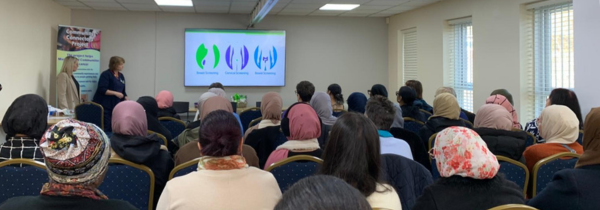November is Lung Cancer Awareness Month
Lung cancer affects around 49,000 people each year and is the third most common cancer in the UK.
Lung cancer may not always have symptoms early on. The symptoms of lung cancer can include:
- a cough for three weeks or more
- a change in a cough you have had for a long time
- persistent breathlessness
- a chest infection that does not get better, or repeated chest infections
- a hoarse voice for three weeks or more
- coughing up blood
- losing weight for no obvious reason
- feeling tired
If you have any of these symptoms, it is important to get them checked by your GP.
It’s probably nothing serious, but finding cancer early makes it more treatable.
About cancer
Cancer is a condition where cells in a specific part of the body grow and reproduce uncontrollably. The cancerous cells can invade and destroy surrounding healthy tissue, including organs. It sometimes begins in one part of the body before spreading to other areas. This process is known as metastasis.
One in two people will develop some form of cancer during their lifetime. In the Black Country, the most common types of cancer are:
- Breast cancer
- Lung cancer
- Cervical cancer
- Bowel cancer
- Skin cancer
In the Black Country we have specific actions to reduce health inequalities through our Core20Plus5 work. Half of the population of the Black Country are identified as in the most deprived 20% areas. For cancer this means that we are working towards earlier cancer diagnosis, with 75% of cases diagnosed at Stage 1 or 2 by 2028.
There are more than 200 different types of cancer, and each is diagnosed and treated in a particular way. Making some simple changes to your lifestyle can significantly reduce your risk of developing cancer such as:
- healthy eating
- taking regular exercise
- not smoking
Contact your GP practice if you experience any of the below symptoms:
- tummy trouble, such as discomfort or diarrhoea for three weeks or more
- blood in your pee even just once
- unexpected or unexplained bleeding
- unexplained pain that lasts three weeks or more
- an unexplained lump
- a cough for three weeks or more (that isn’t COVID 19).
Not all the symptoms of cancer are easy to spot. Contact your GP practice if you experience one or more of these symptoms, for three weeks or more:
- unexplained weight loss
- feeling tired and unwell and not sure why
- heartburn or indigestion
- unusual, pale or greasy poo.
Your GP may refer you for tests to rule out cancer. Most people who go for tests find out it’s not cancer. Finding out sooner is always better. Whatever the result, your NHS is here for you.
Read more about the signs and symptoms of cancer and what to do from nhs.uk
Screening programmes detect cancer early
Screening is the process of identifying healthy people who may have an increased chance of a disease or condition. If detected early its easier to treat. For more information, check out this screening timeline leaflet .
If you are eligible you will get information through the post for these three cancer screening programmes:
Living with and beyond cancer
Living with and beyond cancer (LWBC) is a program of care for cancer patients in the UK. It helps them from diagnosis to recovery. Find out about support that is offered.
Raising cancer awareness within our communities
Macmillan and Black Country Integrated Care Board are working alongside community groups to raise awareness around cancer. Read about what we are doing across the Black Country area.





